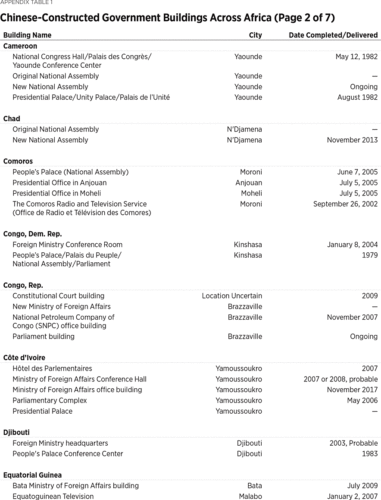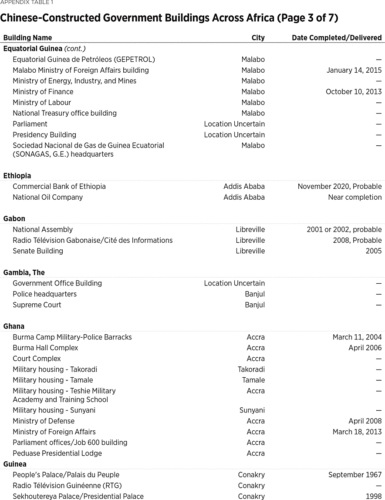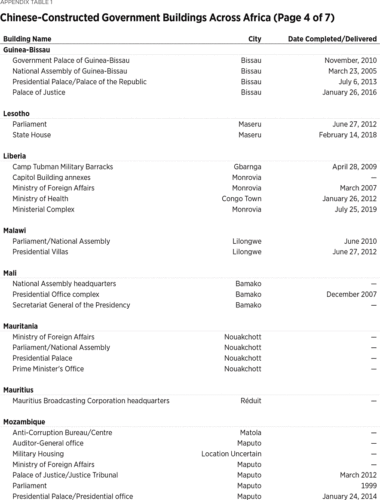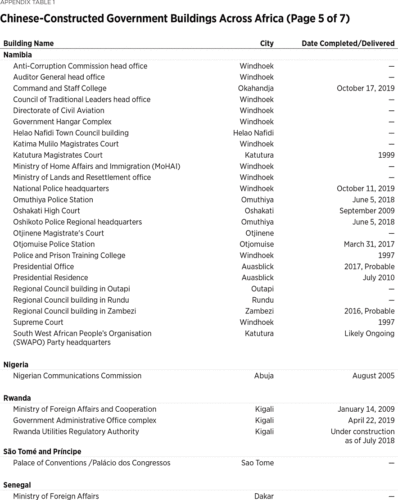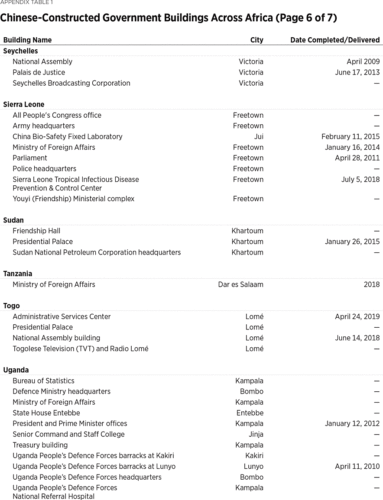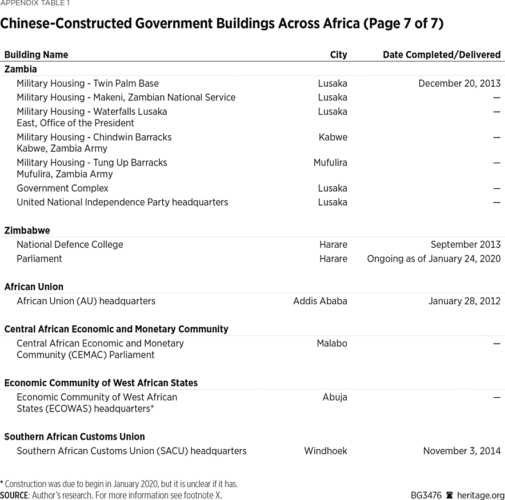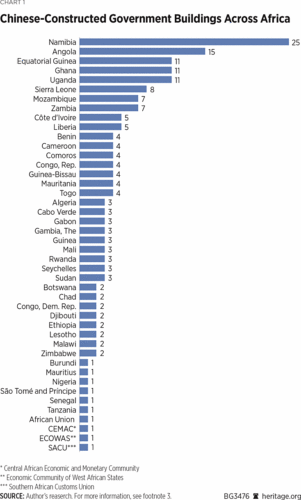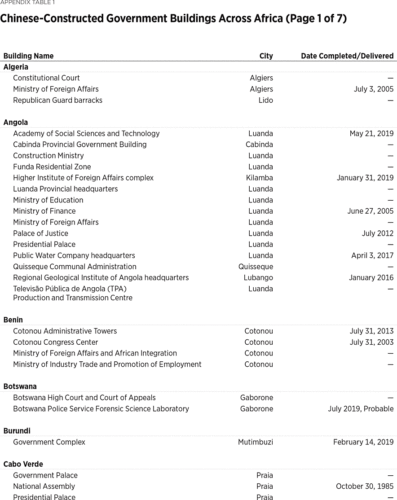PBS: Escaping Eritrea … [Read More...] about ካብ ውሽጢ ቤት ማእሰርታት ኤርትራ
Government Buildings in Africa Are a Likely Vector for Chinese Spying
May 20, 2020 |May 20, 2020|Heritage Foundation
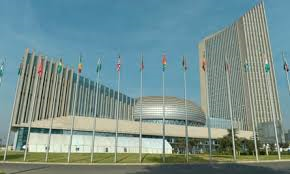
The Chinese Communist Party’s (CCP’s) two-decade-long blitz of engagement in Africa has likely given it extensive surveillance access to the continent. Chinese companies, all of which are legally obliged to help the CCP gather intelligence, have built at least 186 government buildings in Africa and at least 14 sensitive intra-governmental telecommunication networks. Beijing has also donated computers to at least 35 African governments.
The wealth of information the CCP probably gathers in Africa presents four primary dangers for the U.S., as that information could be used to:
- Facilitate Beijing’s influence operations on the continent;
- Recruit intelligence assets at senior levels of African governments;
- Gain insight into U.S. diplomatic strategies, military counterterrorism operations, or joint military exercises; and
- Disadvantage U.S. companies competing against Chinese firms for Africa’s growing economic opportunities.
While the longer-term challenge of Beijing’s extensive influence in Africa can only be addressed by a comprehensive U.S. strategy, Washington can take a number of immediate steps to complicate Chinese surveillance access to Africa. Those steps should include working to understand the nature of Chinese surveillance and how it contributes to Beijing’s influence operations on the continent, educating U.S. companies on the risks, and training its officials on techniques to protect themselves from Beijing’s eavesdropping.
At Least 186 Buildings
In January 2018, the French newspaper Le Monde reported that servers installed by the Chinese telecommunications giant Huawei in the African Union (AU) headquarters were daily uploading their content to servers based in Shanghai, China. An inspection of the building—built by the state-owned China State Construction Engineering Corporation—also uncovered listening devices hidden throughout the building.1
Joan Tilouine and Ghalia Kadiri, “A Addis-Abeba, le Siège de l’Union Africaine Espionné par Pékin,” (In Addis Ababa, the Seat of the African Union Spied on by Beijing) Le Monde, January 26, 2018, https://www.lemonde.fr/afrique/article/2018/01/26/a-addis-abeba-le-siege-de-l-union-africaine-espionne-par-les-chinois_5247521_3212.html (accessed February 20, 2020). Three days later, the Financial Times newspaper confirmed Le Monde’s story.2
John Aglionby, Emily Feng, and Yuan Yang, “African Union Accuses China of Hacking Headquarters,” Financial Times, January 29, 2018, https://www.ft.com/content/c26a9214-04f2-11e8-9650-9c0ad2d7c5b5 (accessed February 20, 2020).
Beijing’s eavesdropping on African government buildings likely extends well beyond the AU headquarters. Since 1966, Chinese companies have constructed or renovated (or both) at least 186 such buildings.3
Wide variety of sources compiled by the author. Particularly helpful were AidData Research and Evaluation Unit, “Geocoding Methodology, Version 2.0.2,” June 1, 2017, https://www.aiddata.org/publications/geocoding-methodology-version-2-0 (accessed February 20, 2020), and David H. Shinn and Joshua Eisenman, China and Africa: A Century of Engagement (Philadelphia: University of Pennsylvania Press, 2012). The 186 number includes three regional and one pan-African building: the Central African Economic and Monetary Community (CEMAC) Parliament, the Economic Community of West African States (ECOWAS) headquarters, the Southern African Customs Union (SACU) headquarters, and the African Union (AU) headquarters, respectively. Construction of the ECOWAS headquarters was slated to begin in January 2020, but it is unclear if construction has started. Nine other buildings appear to still be under construction. In fact, at least 40 of Africa’s 54 countries have a government building constructed by a Chinese company. Given the difficulty of gathering comprehensive data on independent China’s nearly seven decades of engagement with Africa, these numbers are almost certainly an undercount.4
The author did not include in the final number 60 government buildings he found mention of Chinese companies constructing but for which he did not find the source sufficiently reliable and could not obtain other confirmation. The numbers also understate the true extent of Chinese access to African government buildings because some buildings documented here house multiple ministries or sensitive offices. Guinea-Bissau’s Palace of Justice, for instance, houses not only the Supreme Court, but also administrative courts and the Attorney General’s office. Liberia’s recently completed Ministerial Complex is expected to host five ministries and one agency once it is fully staffed. Also, the author only counted once an original Chinese-built structure that was later renovated by a Chinese company, under the reasoning that if the CCP was going to install surveillance access, it would have done so in the initial building. However, if the building was renovated and expanded, then the author included this data. The author also assumed that a Chinese company built any structure financed by China, as the great majority of Chinese financing is conditioned on a Chinese company executing the contract. The author used his best judgment in determining whether to include conference centers. If media reports recounted high-level government meetings at the conference centers, he included them in the count. If there was no indication that the center is used for such meetings, he did not include them. This likely leads to an undercount. Similarly, despite the attractive surveillance opportunities Chinese-built hotels offer, the author included only two of them, the Hôtel des Parlementaires in Cote d’Ivoire and the Presidential Villas within the President Walmont Hotel grounds in Malawi. The former was designed specifically to house members of Parliament, though it was later opened to the general public, and the latter for “discerning international government delegations, long-stay guests and royalty.” For instance, Niamey, Niger, has only one five-star hotel—the Soluxe—and at least some high-ranking delegations visiting Niger would likely stay at the Soluxe. Several author assumptions may have led to a few instances of over-counting the number of Chinese-built buildings, but the net effect of the author’s approach is almost certainly an undercount. See Irene Costa, “Peermon Welcomes Malawi to Its Group,” Business Events Africa, May 4, 2015, https://www.businesseventsafrica.com/2015/05/04/peermont-welcomes-malawi-to-its-group-2/ (accessed February 20, 2020). For a description of Niamey’s Soluxe, see Armin Rosen, “Inside the Amazing Chinese-built Luxury Hotel in the Capital of One of the World’s Poorest Countries,” Business Insider, October 12, 2015, https://www.businessinsider.com/chinese-built-luxury-hotel-in-niger-2015-10 (accessed February 20, 2020).
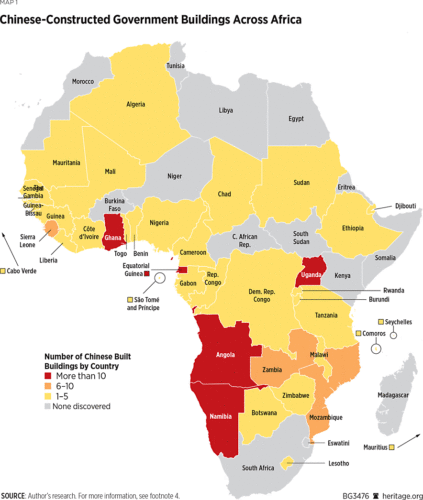
A Tempting Opportunity for the CCP
There are compelling reasons to believe—beyond the fact that it has already done so with the AU headquarters—that the CCP is using the opportunity afforded it by Chinese companies constructing government buildings to gather intelligence.5
A year and a half before the Le Monde expose, a 2016 report mentioned rumors that the Chinese had bugged the AU headquarters. Mathieu Duchâtel, Richard Gowan, and Manuel Lafont Rapnouil, “Into Africa; China’s Global Security Shift,” European Council on Foreign Relations Policy Brief, June 2016, https://www.ecfr.eu/page/-/Into_Africa_China%e2%80%99s_global_security_shift_PDF_1135.pdf (accessed February 20, 2020). Doing so would be in keeping with Beijing’s extensive use of espionage and other malpractice to gain an economic advantage. A 2017 report branded China “the world’s principal IP infringer,”6
The Commission on the Theft of American Intellectual Property, “Update to the IP Commission Report,” The National Bureau of Asian Research, 2017, http://ipcommission.org/report/IP_Commission_Report_Update_2017.pdf (accessed February 26, 2019), while a recent U.S. Trade Representative investigation found that the U.S. loses at least $50 billion every year to unscrupulous Chinese activity.7
“Section 301 Investigation Factsheet,” Office of the United States Trade Representative, June 28, 2019, https://ustr.gov/about-us/policy-offices/press-office/fact-sheets/2018/june/section-301-investigation-fact-sheet (accessed February 26, 2019). The FBI found that China committed 95 percent of the cases of economic espionage reported by 165 American firms,8
Matt Dean, “FBI: China the Most Predominant Economic Espionage Threat to US,” Fox News, July 25, 2015, https://www.foxnews.com/politics/fbi-china-the-most-predominant-economic-espionage-threat-to-us (accessed February 20, 2020). while a German firm estimated that around 20 percent of Germany’s $61 billion in annual losses to espionage were due to Chinese attacks.9
Didi Kirsten Tatlow, “The Chinese Influence Effort Hiding in Plain Sight,” The Atlantic, July 12, 2019, https://www.theatlantic.com/international/archive/2019/07/chinas-influence-efforts-germany-students/593689/ (accessed February 20, 2020).
There is also the attractiveness of the opportunity: Chinese companies have built, expanded, or renovated at least 24 presidential or prime minister residences or offices; at least 26 parliaments or parliamentary offices; at least 32 military or police installations; and at least 19 ministries of foreign affairs buildings. Having surveillance access to these buildings is an extraordinary opportunity for the CCP to gather intelligence directly from the highest levels of African governments. The opportunity is so enticing, in fact, that Beijing may have financed and constructed some of the buildings to improve its surveillance of certain governments.
Furthermore, most of the Chinese companies that built these structures are probably state-owned enterprises (SOEs), given that SOEs undertake a large majority of China’s foreign construction projects.10
Derek Scissors, “Record Chinese Outward Investment in 2016: Don’t Overreact,” American Enterprise Institute, January 2017, https://www.aei.org/wp-content/uploads/2017/01/China-Tracker-January-2017.pdf (accessed February 20, 2020). SOEs, as implements of the CCP, must obey its orders,11
In 2005, the U.S. embassy in Djibouti reported an incident that may have been an attempt by the employee of a state-owned Chinese construction company to gather intelligence on the embassy and the U.S. military base in the area. See “Djibouti: Possible CI Incident,” Wikileaks, March 1, 2005, https://search.wikileaks.org/plusd/cables/05DJIBOUTI208_a.html (accessed February 20, 2020). though in practice it does not matter whether an SOE or private Chinese company was involved. Chinese law compels both to assist the Chinese government in collecting intelligence,12
Elsa Kania, “Much Ado About Huawei (Part 2),” Australian Strategic Policy Institute, March 28, 2018, https://www.aspistrategist.org.au/much-ado-huawei-part-2/ (accessed February 20, 2020). and there are many examples—in addition to Huawei’s role in the AU bugging—of ostensibly private Chinese companies engaging in surveillance and espionage on behalf of the Chinese government.
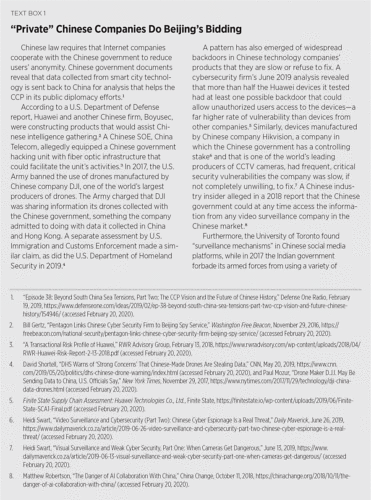
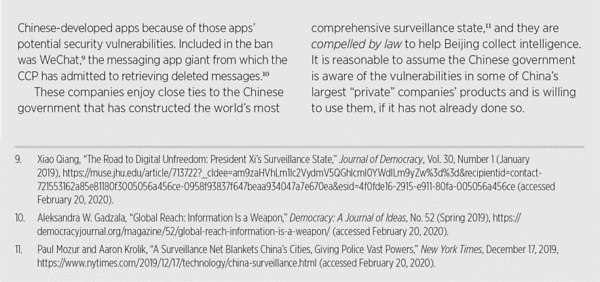
Finally, Beijing’s engagement blitz in Africa for the past two decades demonstrates how important the CCP considers Africa, which presumably makes the continent worth surveilling. Every year, the Chinese Foreign Minister includes Africa in his first overseas trip; from 2008 to 2018, in fact, senior Chinese leadership visited the continent 79 times.13
“Senior leadership” means the president, premier, and foreign minister. Kemi Lijadu, “Chinese Leaders Visit Africa More Often Than You Think and Not Always the Places You Expect,” Quartz Africa, July 26, 2018, https://qz.com/africa/1335418/chinese-leaders-visit-africa-more-often-than-you-think-and-not-always-the-places-you-expect/ (accessed February 20, 2020). In two decades, China–Africa trade increased fortyfold,14
Brook Larmer, “Is China the World’s New Colonial Power?” New York Times, May 2, 2017, https://www.nytimes.com/2017/05/02/magazine/is-china-the-worlds-new-colonial-power.html (accessed February 20, 2020). and China has dramatically increased its military cooperation, investment, and public diplomacy efforts on the continent as well.15
Joshua Meservey, “China in Africa: The New Colonialism?” testimony before the Subcommittee on Africa, Global Health, Global Human Rights, and International Organizations, Committee on Foreign Affairs, U.S. House of Representatives, March 7, 2018, https://docs.house.gov/meetings/FA/FA16/20180307/106963/HHRG-115-FA16-Wstate-MeserveyJ-20180307.pdf (accessed February 20, 2020).
The Chinese state also likely has the capacity to parse the high volume of data they would collect in such a surveillance operation. China is one of the world leaders in artificial intelligence technology that is well suited to sifting immense amounts of data. In places like Xinjiang, Beijing already uses artificial intelligence and other technologies to maintain virtually constant surveillance of the approximately 11 million Uighurs living there. There are reports of Chinese hacking groups utilizing tools that filter short message service (instant messaging) traffic—a staggering amount of data—to track individuals and keywords for later scrutiny.16
Raymond Leong, Dan Perez, and Tyler Dean, “MESSAGETAP: Who’s Reading Your Text Messages?” FireEye, October 31, 2019, https://www.fireeye.com/blog/threat-research/2019/10/messagetap-who-is-reading-your-text-messages.html (accessed February 20, 2020).
The Problem for the U.S.
CCP surveillance of Africa poses a number of problems for the U.S. First, if Beijing’s surveillance blankets the most sensitive offices of some African governments, the CCP can gain insights into leaders’ personalities, habits, and preferences that would help Beijing tailor its influence campaigns directed at senior leaders.
Building such influence is important to achieving the CCP’s goal of becoming an unassailable global power. If it succeeds, the U.S.’s own global power would diminish, given the incompatibility of the American and Chinese political systems. CCP leadership believes political warfare is—as Chairman Mao put it—a “magic weapon,”17
Aaron L. Friedberg, “Competing with China,” Survival: Global Politics and Strategy, Vol. 60, No. 3 (June–July 2018), pp. 7–64, https://www.iiss.org/publications/survival/2018/survival-global-politics-and-strategy-junejuly-2018/603-02-friedberg (accessed February 21, 2020). and the People’s Liberation Army may have the world’s only intelligence agency dedicated to running overseas influence operations.18
John Garnaut, “Australia’s China Reset,” The Monthly, August 2018, https://www.themonthly.com.au/issue/2018/august/1533045600/john-garnaut/australia-s-china-reset (accessed February 20, 2020). Chinese President Xi Jinping has intensified China’s use of the “magic weapon” to influence and intimidate countries around the world,19
Anne-Marie Brady, “Magic Weapons: China’s Political Influence Activities Under Xi Jinping,” paper presented at The Corrosion of Democracy Under China’s Global Influence conference, September 16–17, 2017, https://www.wilsoncenter.org/article/magic-weapons-chinas-political-influence-activities-under-xi-jinping (accessed February 20, 2020). including developed, democratic nations.20
As just one example, in November 2019, the former head of the Australian Security Intelligence Organisation accused the Chinese government of a sweeping interference campaign designed to “take over” Australian politics, a day before news broke that a Chinese spy in Australia defected and offered details of the Chinese government’s infiltration of universities, media houses, and politics in Australia, Taiwan, and Hong Kong. Peter Hartcher, “‘Insidious’: Former ASIO Boss Warns on Chinese Interference in Australia,” The Age, November 22, 2019, https://www.theage.com.au/politics/federal/insidious-former-asio-boss-warns-on-chinese-interference-in-australia-20191121-p53cv2.html (accessed February 20, 2020), and Nick McKenzie, Paul Sakkal, and Grace Tobin, “Defecting Chinese Spy Offers Information Trove to Australian Government,” The Age, November 23, 2019, https://www.theage.com.au/national/defecting-chinese-spy-offers-information-trove-to-australian-government-20191122-p53d1l.html (accessed February 20, 2020).
The effort is paying dividends in Africa. The governments there are usually reliable Chinese allies in international forums. In 1971, African states provided more than one-third of the votes that transferred the U.N. Security Council seat from Taiwan to China.21
Irene Yuan Sun, Kartik Jayaram, and Omid Kassiri, Dance of the Lions and Dragons: How Are Africa and China Engaging, and How Will the Partnership Evolve? McKinsey & Company, https://www.africa-newsroom.com/files/download/aa9f2979a3dc18e (accessed February 20, 2020). In 1989, Africa helped Beijing weather a period of international isolation after the Chinese military massacred unarmed protesters in Tiananmen Square.22
Centre for Chinese Studies, China’s Engagement of Africa: Preliminary Scoping of African Case Studies, University of Stellenbosch, November 2007, http://www0.sun.ac.za/ccs/wp-content/uploads/2009/04/rf_paper_final.pdf (accessed February 20, 2020). Today, African governments are helping whitewash Beijing’s large-scale human rights abuses in Xinjiang23
Eric Olander, “Most African States Quietly Take China’s Side in Xinjiang Battle at the United Nations,” China–Africa Project, October 31, 2019, https://chinaafricaproject.com/analysis/most-african-states-quietly-take-chinas-side-in-xinjiang-battle-at-the-united-nations/ (accessed February 20, 2020). and have helped Chinese nationals win leadership of influential international organizations.24
Ministry of Foreign Affairs of the People’s Republic of China, “Wang Yi: Thank African Countries for Supporting the Chinese Candidate’s Election as Director-General of the World Food and Agriculture Organization (FAO),” June 25, 2019, https://www.fmprc.gov.cn/mfa_eng/zxxx_662805/t1676251.shtml (accessed February 20, 2020).
A second, and related, problem for the U.S. is that Chinese surveillance could enable Beijing to recruit highly placed assets within African governments. If the CCP collected embarrassing or harmful information on an African official, it could blackmail cooperation from him or her. Or surveillance could gather other information, such as a recruitment target’s financial situation, which could facilitate recruitment. Having Chinese assets peppered throughout governments on an increasingly strategic continent is an obvious problem for the United States.25
For discussion of why Africa is increasingly important to the United States’ strategic interests, see Joshua Meservey, “Implications of China’s Presence and Investment in Africa,” testimony before the Subcommittee on Emerging Threats and Capabilities, Committee on Armed Services, U.S. Senate, December 12, 2018, https://www.armed-services.senate.gov/imo/media/doc/Meservey_12-12-181.pdf (accessed February 20, 2020).
Third, Beijing’s spying could pick up sensitive conversations between senior American officials and their African counterparts. That would include U.S. military officers who frequently meet with senior African officials to discuss joint military exercises, counterterrorism operations, and other activities it would be best not to divulge to a competitor like China. A September 2019 report detailed how the Chinese government conducted just that sort of surveillance operation against foreign officials by hacking telecommunications companies in Asia.26
Jack Stubbs, “China Hacked Asian Telcos to Spy on Uighur Travelers: Sources,” Reuters, https://www.reuters.com/article/us-china-cyber-uighurs/china-hacked-asian-telcos-to-spy-on-uighur-travelers-sources-idUSKCN1VQ1A5 (accessed February 20, 2020).
Fourth, American businesses competing for the continent’s lucrative opportunities may suffer harm. U.S. companies would be at a disadvantage if any negotiating strategies, bids, or business processes they might discuss with an African leader were known by a Chinese competitor. This includes U.S. tech companies—long a prized target of Chinese commercial espionage—that are increasingly active in Africa. The Chinese government’s practice of supporting its companies—particularly its “national champions” such as Huawei—through anticompetitive means, including economic espionage, suggests it would pass any commercially useful information it gleaned to a Chinese company.27
Matthew Brazil, co-author of the recent book Chinese Communist Espionage: An Intelligence Primer, makes the point explicitly: “Other countries focus on stealing classified information…. The CCP pursues this standard espionage but also focuses on tech theft to benefit not only its military but also its state-owned enterprises.” There are many examples. For instance, in 2014, a U.S. grand jury indicted members of the Chinese military for stealing information from a variety of U.S. companies. Also, British intelligence reportedly believed that a hack of the British mining giant Rio Tinto that cost the company more than $1 billion was also launched by the Chinese military. Robert Mclean, “U.S. Steel Accuses China of Stealing Trade Secrets,” CNN, April 27, 2016, http://money.cnn.com/2016/04/27/news/companies/us-steel-china-investigation-trade/ (accessed February 20, 2020), and Kit Chellel, Franz Wild, and David Stringer, “When Rio Tinto Met China’s Iron Hand,” Bloomberg, July 13, 2018, https://www.bloomberg.com/news/features/2018-07-13/did-china-hack-rio-tinto-to-gain-a-billion-dollar-advantage (accessed February 20, 2020). For Brazil’s quote, see Bethany Allen-Ebrahimian, “New Book Unveils China’s Formidable Spy Agencies,” Axios, February 5, 2020, https://www.axios.com/china-spy-agencies-66e43830-e60c-458d-b9dc-053a6152f9fd.html (accessed February 20, 2020).
The risk to U.S. companies is perhaps higher than it has ever been. A significant part of China’s technological progress is built from technology and intellectual property stolen or coerced from the West, especially the United States.28
The Federal Reserve Bank of Minneapolis in 2015 estimated that over 50 percent of all Chinese companies’ technology was taken from foreign companies. Thomas J. Holmes, Ellen R. McGrattan, and Edward C. Prescott, “The Costs of Quid Pro Quo,” Federal Reserve Bank of Minneapolis, January 29, 2015, https://www.minneapolisfed.org/research/economic-policy-papers/the-costs-of-quid-pro-quo (accessed February 20, 2020). In recent years, the CCP has escalated its theft of U.S. commercial secrets29
Del Quentin Wilber, “China ‘Has Taken the Gloves Off’ in Its Thefts of U.S. Technology Secrets,” Los Angeles Times, November 16, 2018, https://www.latimes.com/politics/la-na-pol-china-economic-espionage-20181116-story.html (accessed February 20, 2020), and Junhua Zhang, “The Trade War, Huawei, and Chinese Strategy,” Geopolitical Intelligence Services, June 12, 2019, https://www.gisreportsonline.com/the-trade-war-huawei-and-chinese-strategy,economy,2899.html (accessed February 20, 2020). as President Xi Jinping seeks to achieve the ambitious goals laid out in his Made in China 2025 strategy, lessen Chinese dependence on Western technologies, and gain leverage against Washington in the ongoing trade war. The existential nature of the task suggests Xi will use every means at his disposal, including whatever surveillance capabilities China has in Africa.
The Problem for Africa
African countries have yet to develop the sort of cutting-edge technologies the Chinese government and its companies target, and so cannot suffer the same losses that the U.S. and many other countries have from Chinese theft. Yet there is a dynamic, emerging technology industry in Africa. If it produces technology the Chinese government or one of its companies covet, that technology would be at great risk of being poached. Chinese companies have already done this in West Africa, enabling them to dominate the region’s wax-print fabric industry and force out indigenous competitors.30
Chinese companies used “design espionage, business espionage and stealing of techniques and machinery ideas and patterns” to dominate the industry. Chidinma Irene Nwoye, “Your Favorite Wax Print Wasn’t Really African and a Chinese Takeover Means it Never Will Be,” Quartz Africa, November 25, 2018, https://qz.com/africa/1474039/wax-print-african-fashion-and-chinese-importers/ (accessed February 20, 2020).
The bigger economic risk for African governments is that they frequently negotiate with the Chinese government, its banks, and its companies, as China is by far the largest bilateral lender to the continent,31
Wenjie Chen and Roger Nord, “China and Africa: Crouching Lion, Retreating Dragon?” in Brahima S. Coulibaly, ed., Foresight Africa: Top Priorities for the Continent in 2018, https://www.brookings.edu/wp-content/uploads/2018/01/foresight-2018_full_web_final2.pdf (accessed February 20, 2020). and Chinese companies dominate Africa’s lucrative infrastructure construction sector.32
Sun, Jayaram, and Kassiri, Dance of the Lions and Dragons. Chinese eavesdropping could gain valuable information on African governments’ negotiating strategies, competitors’ bids, and other relevant information: There are reports of Chinese hackers stealing just that sort of information in other parts of the world.33
It is possible this danger is not as pronounced as it might be. African rulers can personally benefit from Chinese engagement, whether it be through accepting bribes, using China’s “no-strings-attached” aid to fuel patronage, or receiving glitzy infrastructure projects to present as evidence to voting constituents of how effective they are. Some African rulers may not negotiate as good terms for their countries with Chinese banks and companies as they might absent such personal inducements. For the reports of the Chinese hackers, see “Report: Chinese Hackers Resume Attacks on U.S. Targets,” CBS News, August 7, 2013, https://www.cbsnews.com/news/report-chinese-hackers-resume-attacks-on-us-targets/ (accessed February 20, 2020); Chellel, Wild, and Stringer, “When Rio Tinto Met China’s Iron Hand”; and Laurie Chen, “‘Chinese’ Cyber Spy Ring Accused of Targeting Key Players in Belt and Road Initiative,” South China Morning Post, June 13, 2019, https://www.scmp.com/news/china/society/article/3014421/chinese-cyber-spy-ring-accused-targeting-key-players-belt-and (accessed February 20, 2020).
As noted earlier, it is also possible Chinese surveillance of such buildings could collect damaging or embarrassing information about a country’s senior leadership. That material could be used as leverage to ensure African leaders’ pliability, to the harm of the countries they represent.
It Is Not Just Buildings
There are other elements of the counterintelligence problem the U.S. faces in Africa. Huawei has built more than 70 percent of the 4G telecom networks in Africa34
“Huawei Looks to Africa to Cut Network Deals,” African Business Central, March 25, 2016, https://www.africanbusinesscentral.com/2016/03/25/huawei-looks-to-africa-to-cut-network-deals/ (accessed February 20, 2020). and is proceeding with plans to deploy 5G networks on the continent.35
Among many other warnings about the security risks posed by Chinese-built 5G networks, a group of former senior U.S. military officers penned an open letter cautioning that “Chinese-designed 5G networks will provide near-persistent data transfer back to China that the Chinese government could capture at will.” See “Former U.S. Military Leaders Warn of Risks to Future Combat Operations Posed by Chinese-Built 5G Networks,” The Washington Post, April 2, 2019, https://www.washingtonpost.com/context/former-u-s-military-leaders-warn-of-risks-to-future-combat-operations-posed-by-chinese-built-5g-networks/?noteId=75d276c8-8ac5-4dc7-98c7-981ec0a5da72&questionId=b41ae8c1-2697-4dd7-9a16-a56318713b37 (accessed February 20, 2020). For a report on Huawei’s 5G activities in Africa, see Chris Kelly, “Huawei and MTN Group Take First Steps towards 5G in Africa,” Total Telecom, November 13, 2019, https://www.totaltele.com/504243/Huawei-and-MTN-Group-take-first-steps-towards-5G-in-Africa (accessed February 20, 2020). Huawei, ZTE (another Chinese telecommunications giant), and other Chinese telecoms have built and/or equipped at least 14 government networks, including dedicated military and police telecoms systems.36
Tracking these networks was not the focus of the author’s research, so this number almost certainly understates Chinese companies’ involvement in creating or upgrading government communications systems that are supposed to be secure. The author’s count also only reflects the number of countries in which there are such Chinese-built systems, not the total number of Chinese-built systems. That is a significant distinction, as Chinese companies have built multiple telecommunications systems in many countries. Many are e-governance networks designed to expand, harmonize, and streamline government communications and online services. Other examples include Uganda’s Tetra Communications System, implemented by Huawei, used by the military, police, and intelligence agencies; or Kenya’s ZTE-built e-government system based in the National Intelligence Service’s headquarters. A U.S. government report said that the “project involved a secure network for Kenyan e-Government activities, including software and computer-based security, and a two-story complex that would house the entire Kenyan governments’ network files.” In Ghana, parliament recently approved a loan from Huawei and state-owned China Machinery Engineering Corporation to construct the country’s “National Security Communication Enhancement Network.” For mention of Uganda’s system, see AidData Research and Evaluation Unit, “Geocoding Methodology, Version 2.0.2.” For the U.S. report on Kenya, see “Chinese Engagement in Kenya,” WikiLeaks, February 17, 2010, https://search.wikileaks.org/plusd/cables/10NAIROBI181_a.html (accessed February 20, 2020). For the Ghana report, see Lawrence Markwei, “Ghana: Parliament Ratifies 2 Loan Agreements,” All Africa, November 29, 2019, https://allafrica.com/stories/201911290488.html (accessed February 20, 2020).
Furthermore, the Chinese government has donated office equipment, including computers, to at least 35 African governments over the years.37
Variety of sources compiled by author. Given the incomplete nature of the data on such donations, this is almost certainly an undercount of how frequently this occurs. It is difficult to believe the Chinese government did not take the opportunity to make those computers vulnerable to Chinese spying before gifting them.
African leaders are likely aware of at least some of the vulnerabilities such Chinese gifts bring—and are either too far under the influence of Beijing to resist, believe that Beijing’s surveillance does not matter,38
Some African leaders’ reactions to the AU bugging report demonstrates this mentality. The head of the AU, Moussa Faki, and Rwandan President Paul Kagame said in separate interviews that the AU headquarters does not have any secret defense dossiers, implying the Chinese have no reason to spy on the AU. Burundian President Pierre Nkurunziza told Chinese state media he did not believe the report of the AU bugging, and that it was a Western plot to sow division between China and Africa. Ben Blanchard, “African Union Says Has No Secret Dossiers After China Spying Report,” Reuters, February 8, 2018, https://www.reuters.com/article/us-china-africanunion/african-union-says-has-no-secret-dossiers-after-china-spying-report-idUSKBN1FS19W (accessed February 20, 2020); Aaron Masho, “China Denies Report it Hacked African Union Headquarters,” Reuters, January 29, 2018, https://www.reuters.com/article/us-africanunion-summit-china/china-denies-report-it-hacked-african-union-headquarters-idUSKBN1FI2I5 (accessed February 20, 2020); and “Burundian President Refutes Reports Accusing China of Spying on AU,” Xinhua, February 7, 2018, http://www.xinhuanet.com/english/2018-02/07/c_136955756.htm (accessed February 20, 2020). or that they can manage the challenge. A Zambian government official said that his government had “changed the locks” after Huawei finished constructing Zambia’s national data center that processes and stores all government data.39
Sheridan Prasso, “China’s Digital Silk Road Is Looking More Like an Iron Curtain,” Bloomberg, January 10, 2019, https://www.bloomberg.com/news/features/2019-01-10/china-s-digital-silk-road-is-looking-more-like-an-iron-curtain (accessed February 20, 2020). Yet intelligence officials from some of the world’s most sophisticated cyber powers such as the U.S., the U.K., Japan, and Germany do not believe their countries can adequately protect against the intelligence threat posed by Huawei-built systems.40
Andy Keiser and Bryan Smith, “Chinese Telecommunications Companies Huawei and ZTE: Countering a Hostile Foreign Threat,” The National Security Institute Policy Paper, January 24, 2019, https://nationalsecurity.gmu.edu/chinese-telecommunications/ (accessed February 20, 2020), and Noah Barkin, Tweet, October 29, 2019, 7:02 a.m., https://twitter.com/noahbarkin/status/1189135507906846723?s=11. (accessed February 20, 2020). Barkin is a journalist and visiting academic fellow at the Mercator Institute for China Studies. (“The head of Germany’s foreign intelligence agency has just made crystal clear at a public Bundestag hearing that he does not believe Chinese firms should be allowed to participate in #5G infrastructure. If they are allowed in, then Merkel is ignoring advice of her intel agencies.”) If those countries, with their extensive budgets and advanced capabilities cannot, it is unlikely African countries with far fewer resources can.
Steps for Addressing a Serious Problem
Protecting U.S. interests requires an American response as determined and holistic as the CCP’s efforts to reshape the global order and should include, whenever possible, pushing back against damaging Chinese activity everywhere it occurs.
In Africa, that means not simply acquiescing to broad Chinese surveillance access to the continent. For the foreseeable future, it will be impossible to fully protect against Chinese spying in Africa, as Beijing’s access there is enabled by its successful, long-running influence-building campaign on the continent. The problem that reality poses for American interests can only be addressed by a comprehensive U.S. strategy.41
For ideas for what the U.S. approach to China in Africa should be, see Joshua Meservey, “Looking Forward: U.S.–Africa Relations,” testimony before the Subcommittee on Africa, Global Health, Global Human Rights, and International Organizations, Committee on Foreign Affairs, U.S. House of Representatives, March 26, 2019, https://foreignaffairs.house.gov/2019/3/looking-forward-u-s-africa-relations (accessed February 20, 2020).
Yet Washington can take a number of immediate steps to complicate Chinese surveillance in Africa, including the following:
- Assume that all communication with African government counterparts is vulnerable to Chinese exploitation. This should be the baseline assumption for all American officials operating in Africa.
- Develop government-wide counterintelligence protocols and training for operating in Africa. Every U.S. official visiting or posted to Africa should receive a standardized training on techniques for combatting Chinese surveillance. Such training should be supplemented with country-specific information on the unique risks different countries pose. It will be impossible to always fully defeat Chinese surveillance in Africa, but the U.S. can and should make it harder.
- Task all U.S. embassies in Africa with developing a digital hygiene outreach program as a key part of their host-country engagement. Embassies should offer assistance to host-country governments with protecting their vital digital networks and infrastructure. This could include best-practices training or technical support for sweeping networks or buildings. If a government is interested in assistance beyond the embassy’s capabilities, the embassy could solicit help from other U.S. agencies with the requisite expertise.
- Map potential vectors of Chinese surveillance and influence. U.S. embassies and other U.S. agencies active on the continent should document potential entry points for Chinese surveillance, such as Chinese-built government buildings and telecommunications networks. That information should be compiled and made accessible to policymakers to better understand the contours of Chinese engagement in a particular country or region, the risks it poses, and possible countermeasures.
- Educate U.S. companies on the surveillance risks in specific countries. A standard part of any briefing a U.S. embassy gives to American companies interested in or already operating in a particular African country should include best practices for protecting themselves as much as possible from Chinese surveillance. The embassy should share any unclassified, relevant data with American companies operating in the country.
- Expect little help—and perhaps even resistance—from some African states. Given how adroitly the CCP has built influence in Africa and the many examples of African countries fearing to defy Beijing, the U.S. should not expect these governments to offer much assistance in ameliorating America’s counterintelligence problem in Africa. Some, if asked, or in an attempt to curry CCP favor, may even actively collaborate with Beijing to hinder American efforts to protect its interests on the continent.
A Broader Challenge
Africa may be the most permissive region on earth for Chinese spying and espionage. Beijing and its companies have enormous sway over many African governments, whether because of personal inducements to African leaders42
Joshua Meservey, “Chinese Corruption in Africa Undermines Beijing’s Rhetoric About Friendship With the Continent,” Heritage Foundation Issue Brief No. 4895, August 8, 2018, https://www.heritage.org/global-politics/report/chinese-corruption-africa-undermines-beijings-rhetoric-about-friendship-the (accessed February 20, 2020). or because of African countries’ economic enmeshment with China—something Beijing increasingly uses as a weapon.43
There are numerous incidents of China retaliating economically against countries that displease it. In 2006, Zambia’s ambassador to China publicly warned that Chinese investors had paused further investment in the country as they were concerned about the possible election to the presidency of a pro-Taiwan candidate. In 2017, the former President of Botswana, Ian Khama, revealed that China threatened to use its influence with African states to isolate Botswana if the Dalai Lama were allowed to visit the country. After Chinese dissident Liu Xiaobo won the Nobel Peace Prize in 2010, China partially closed itself to imports of Norwegian salmon. Beijing similarly restricted exports of rare earth minerals to Japan in 2010 during a maritime dispute, and in 2012 curtailed Filipino banana imports during a row with Manila. Australia, Canada, Mongolia, New Zealand, South Korea, and Taiwan have at various times suffered similar fates for opposing the CCP’s wishes. John Reed, “China Intervenes in Zambian Election,” Financial Times, September 5, 2006, https://www.ft.com/content/d6d5d176-3d0a-11db-8239-0000779e2340 (accessed February 20, 2020); Dikarabo Ramadubu, “‘We Are Not a Colony of China’—Khama,” Botswana Guardian, August 21, 2017, www.botswanaguardian.co.bw/news/item/2790-we-are-not-a-colony-of-china-khama.html (accessed February 20, 2020); Tone Sutterud and Elisabeth Ulven, “Norway Criticised Over Snub to Dalai Lama During Nobel Committee Visit,” The Guardian, May 6, 2014, https://www.theguardian.com/world/2014/may/06/norway-snub-dalai-lama-nobel-visit (accessed February 20, 2020); Peter Harrell, Elizabeth Rosenberg, and Edoardo Saravalle, China’s Use of Coercive Economic Measures, Center for a New American Security, June 2018, https://s3.amazonaws.com/files.cnas.org/documents/China_Use_FINAL-1.pdf?mtime=20180604161240 (accessed February 20, 2020); and Matt Schrader, “Huawei’s PR Campaign Comes Straight From the Party’s Playbook,” Foreign Policy, June 6, 2019, https://foreignpolicy.com/2019/06/06/huaweis-pr-campaign-comes-straight-from-the-partys-playbook/ (accessed February 20, 2020). This suggests some African governments might hesitate to be appropriately skeptical of Chinese intentions.
African countries also have limited cyber-defense capabilities. All of this is in addition to the extraordinary potential for surveillance access the CCP has from the computers it donates to African governments and the Chinese companies building government buildings and sensitive (including intra-governmental) communications networks.
The CCP’s surveillance of Africa is only one part of the much larger challenge an increasingly globally assertive China poses for the U.S. Yet it contributes to the problem, and Washington should respond. It can start by working to understand the nature of Chinese surveillance and how it contributes to Beijing’s influence operations on the continent, educating U.S. companies on the risks, and training its officials on techniques to complicate Beijing’s information gathering on the continent.
Joshua Meservey is Senior Policy Analyst for Africa and the Middle East in the Douglas and Sarah Allison Center for Foreign Policy, of the Kathryn and Shelby Cullom Davis Institute for National Security and Foreign Policy, at The Heritage Foundation.
